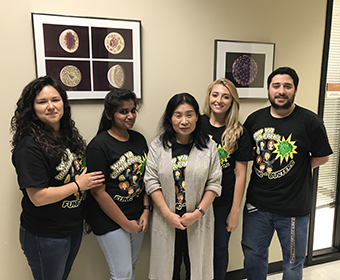
Chiung-Yu Hung and her research team.
(July 23, 2018) -- Chiung-Yu Hung, assistant professor of biology at The University of Texas at San Antonio (UTSA), has received a five-year, $1.9 million grant from the U.S. Department of Health and Human Services to support her efforts to create a vaccine for fungal infections.
Unlike bacteria or viruses, there is currently no vaccine available for any type of fungal infection. Fungi are more complex organisms, containing far more components, which makes developing an effective vaccine to battle them much more difficult than efforts to combat a virus or bacterial infection.
Hung’s work focuses on two types of the fungus Coccidioides, which exists in the soil of Southwest Texas, Southern Arizona, California and Northern Mexico. When the soil is disturbed by animals or humans, the fungal spores are released into the air, causing a respiratory infection called valley fever.
“Any human living in the endemic area could inhale the spores into their lungs, which causes an infection,” Hung said. “The majority of people don’t feel it, but some of them will develop flu-like symptoms and a small portion could even develop chronic pneumonia.”
Without proper treatment, the fungus could also spread to the central nervous system, where it could cause meningitis, a potentially fatal condition. Hung’s goal is to stop these infections before they occur by developing what could be the first anti-fungal vaccine.
“It’s a testament to the advances in vaccines for viruses and bacteria that this effort is now possible,” Hung said. “It’s very exciting to be breaking new ground and working to create something that could prevent illness and even save lives.”
As a member of the UTSA South Texas Center for Emerging Infectious Diseases, Hung is one of many researchers specializing in the study of vaccine development, biodefense, immunology and molecular microbiology. She is the author of several studies on Coccidioides and similar fungi.
“I welcome the HHS funding for University of Texas at San Antonio’s (UTSA) South Texas Center for Emerging Infectious Diseases, which focuses on fungal infections with the Coccidioides species,” said Congressman Joaquin Castro. “San Antonio continues to lead in medicine development with groundbreaking research, and this grant will help boost wellness and quality of life for Americans across Texas and our nation.”
UTSA is ranked among the nation’s top five young universities, according to Times Higher Education.
Learn more about the UTSA South Texas Center for Emerging Infectious Diseases.
Learn more about the UTSA Department of Biology.
Connect with UTSA online at Facebook, Twitter, YouTube, Instagram and LinkedIn.
UTSA Today is produced by University Communications and Marketing, the official news source of The University of Texas at San Antonio. Send your feedback to news@utsa.edu. Keep up-to-date on UTSA news by visiting UTSA Today. Connect with UTSA online at Facebook, Twitter, Youtube and Instagram.
Move In To COLFA is strongly recommended for new students in COLFA. It gives you the chance to learn about the Student Success Center, campus resources and meet new friends!
Academic Classroom: Lecture Hall (MH 2.01.10,) McKinney Humanities BldgWe invite you to join us for Birds Up! Downtown, an exciting welcome back event designed to connect students with the different departments at the Downtown Campus. Students will have the opportunity to learn about some of the departments on campus, gain access to different resources, and collect some giveaways!
Bill Miller PlazaJoin us for an intimate evening of cocktails, conversation, and culinary inspiration with Pati Jinich, Emmy-nominated chef and James Beard Award-winning author. Enjoy light bites and signature drinks in the warm, modern setting of Mezquite as Pati connects with guests over her passion for Mexican cuisine and storytelling.
Mezquite Restaurant in Pullman Market, 221 Newell Ave., San Antonio 78215From inspired courses to thoughtful pairings and a rich sense of community, the Ven a Comer Signature Dinner is a night of shared meals, shared stories, and unforgettable flavor.
Stable Hall (Pear Brewery), 307 Pearl Pkwy, San Antonio 78215Come and celebrate this year's homecoming at the Downtown Campus with food, games, giveaways, music, and more. We look forward to seeing your Roadrunner Spirit!
Bill Miller PlazaThe University of Texas at San Antonio is dedicated to the advancement of knowledge through research and discovery, teaching and learning, community engagement and public service. As an institution of access and excellence, UTSA embraces multicultural traditions and serves as a center for intellectual and creative resources as well as a catalyst for socioeconomic development and the commercialization of intellectual property - for Texas, the nation and the world.
To be a premier public research university, providing access to educational excellence and preparing citizen leaders for the global environment.
We encourage an environment of dialogue and discovery, where integrity, excellence, respect, collaboration and innovation are fostered.